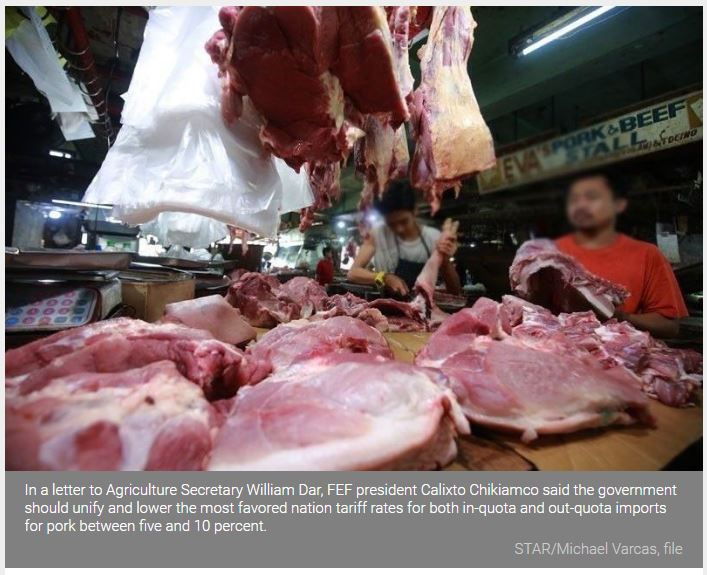Philippines: Unified lower tariff for pork imports pushed
MANILA, Philippines — The Foundation of Economic Freedom (FEF) is pushing for a unified lower tariff for pork imports as it backs the government’s move to bring in more pork at lower taxes to boost inventory.
In a letter to Agriculture Secretary William Dar, FEF president Calixto Chikiamco said the government should unify and lower the most favored nation (MFN) tariff rates for both in-quota and out-quota imports for pork between five and 10 percent.
Such a move, he said, would address the pork price crisis immediately.
“Lowering that tariff to 10 percent or five percent can better generate significant household savings, and will eventually make our hog industry more competitive,” Chikiamco said.
Currently, for in-quota or those within the minimum access volume (MAV), a five percent tariff is proposed for the first six months. This will be increased to 10 percent for the next six months.
Current imports under MAV, which stand at 54,000 metric tons, are slapped with a 30 percent tariff.
For those outside MAV, a proposal of 15 percent tariff is eyed for the first six months and 20 percent for the next six months. Out-quota imports are currently levied at 40 percent.
The matter on tariff reduction is still with the Tariff Commission (TC) and stakeholders are being given until Tuesday to present their position papers.
The TC will then make a recommendation to the Cabinet-level Committee on Tariff and Related Matters if the tax cut is necessary or not.
Further, the FEF is also supporting DA’s proposal to expand the MAV to 162,000 MT, provided that certain conditions are met including amount of the shortage itself and that the allocation of MAV import permits is on a first-come-first-served basis with realistic economic size allotments.
Chikiamco said there should be close monitoring of speedy use of MAV import permits and cancellation of such for failing to bring in the imported pork within a prescribed time frame, as well as a quick reallocation of unused MAVs.
“The conditions for MAV to be effective in solving this problem are difficult to administer. If the government considers using the tariff solution, then we can quickly bring in the volume needed to stabilize supply and prices of pork,” he said.
The FEF urged the government to address the root cause of the price spikes, which is the African swine fever (ASF).
“Producers will invest in new hog production if the government guarantees at least reimbursement of production costs plus cash assistance once it decides on terminating hogs in ASF-contaminated farms,” Chikiamco said.
Source: https://www.philstar.com/business/2021/02/07/2075822/unified-lower-tariff-pork-imports-pushed


 Thailand
Thailand




